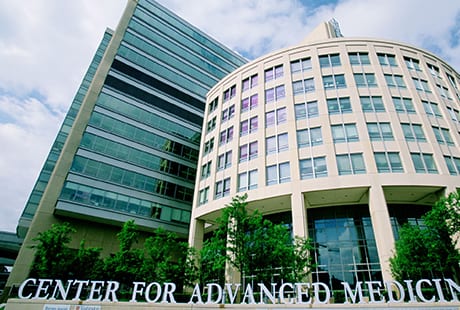Washington University neurosurgeons have literally written the book on how to manage and treat brain cysts.
Call 314-362-3577 for Adult Appointments
What is a brain cyst?
Colloid cysts, arachnoid cysts, and pineal cysts are generally benign (non-cancerous) congenital lesions within or next to the brain that may expand slowly due to trapping of fluids normally produced by the brain. Growth of these lesions can cause obstruction of normal fluid flow or mass effect on the brain which can lead to headaches, hydrocephalus, nausea, dizziness, memory and/or mood problems, and other behavioral or neurological problems. Many cysts do not grow or cause such problems, but may be found incidentally when imaging of the head is performed for other reasons.

Colloid cyst before surgery.

Colloid cyst after surgery.
Why rely on Washington University experts to treat your brain cyst?
Not all brain cysts require surgical therapy, but being diagnosed with a brain cyst can cause a lot of anxiety. Patients can be comforted knowing that the compassionate neurosurgeons at WashU Medicine have the institutional expertise to effectively know if and how to treat these conditions. In fact, WashU neurosurgeons developed a tool called the Colloid Cyst Risk Score (CCRS), that helps guide neurosurgeons to choose the best treatment approach for each patient.

In 2024, former Chair of WashU Neurosurgery Ralph G. Dacey, Jr., MD, neurosurgery residency alumni Thomas Beaumont, MD, PhD, and their colleague Peter Navaji, MD, co-authored the book Colloid Cysts of the Third Ventricle: Natural History, Decision-Making, and Operative Management. The textbook was developed to “enhance the ability of neurosurgeons at any stage to provide thoughtful, up-to-date options to patients with colloid cysts, with the ultimate goal of improved outcomes.”
Treatments
WashU neurosurgeons utilize safe, effective, and gentle surgical approaches to treating brain cysts, including the minimally invasive endoscopes and stereotactic robotic assistance. These technologies allow surgeons to avoid more extensive craniotomies in most cases – enabling smaller incisions with the goal of enhancing patient comfort and speeding recovery time.


